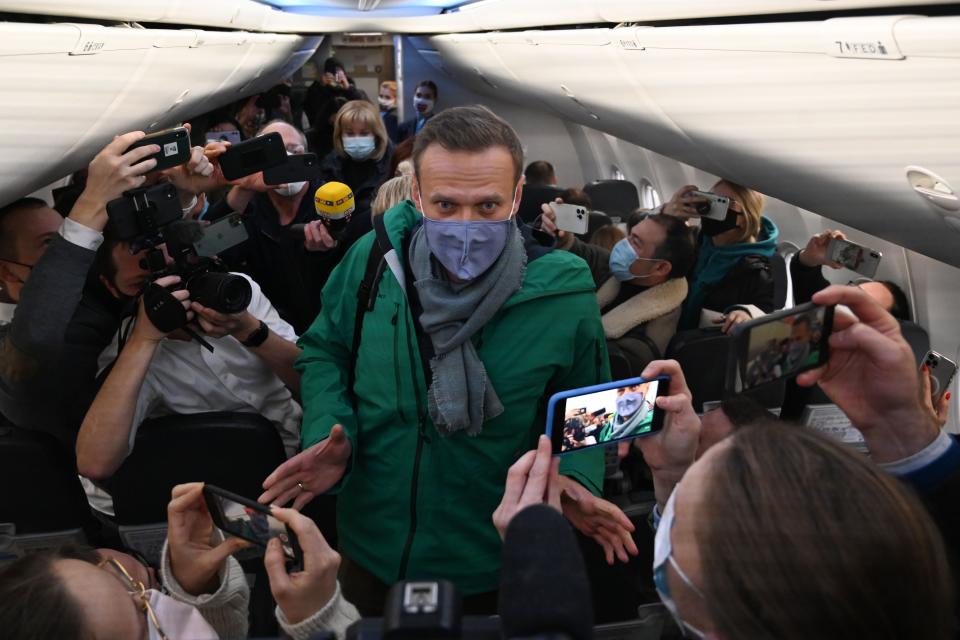Putin critic Alexei Navalny detained upon return to Russia after poisoning
- Oops!Something went wrong.Please try again later.
- Oops!Something went wrong.Please try again later.
Russian opposition leader Alexei Navalny has been detained after defiantly flying back to Moscow on Sunday, his spokesperson said, months after he was left in a coma when he was poisoned with the nerve agent Novichok.
Facing the threat of his arrest upon touching down, Navalny, a prominent critic of the Kremlin and Russian President Vladimir Putin, boarded a plane in Berlin, where he had been evacuated for treatment in August from a hospital in Siberia at the insistence of his family.
The plane, which was originally headed for Moscow's Vnukovo Airport, was diverted to the capital's Sheremetyevo Airport shortly before it landed, Navalny's press officer, Kira Yarmysh, confirmed in a tweet, without explaining why the plane was rerouted.
Yarmysh posted a video of Navalny being escorted away by officials in Sheremetyevo, saying he was being detained without explanation and was not allowed to bring his lawyer. His whereabouts and status are unknown, Yarmysh tweeted Sunday.
Задержание Алексея pic.twitter.com/q3mq4VZgBG
— Кира Ярмыш (@Kira_Yarmysh) January 17, 2021
Russia's Federal Penitentiary Service released a statement to the state-run media agency Tass confirming that Navalny was being detained, allegedly for "repeated violations of the probationary period." He will remain in custody until he can appear in court, the statement said.
While Navalny, 44, was in the air, the Russian broadcaster Dozhd TV showed images of his associates, including the lawyer and politician Lyubov Sobol, being detained as they were waiting for him at Vnukovo Airport.
Inside and outside the airport, hundreds of people defied a warning from the Moscow prosecutor's office to welcome Navalny. Dozhd TV showed images of some supporters being detained and riot police moving in.
Security measures were heightened at the airport, and several prisoner transport trucks could be seen outside.
Jake Sullivan, President-elect Joe Biden's appointee as national security adviser, denounced Navalny's detention and insisted that those who poisoned him must be held accountable.
"The Kremlin's attacks on Mr. Navalny are not just a violation of human rights, but an affront to the Russian people who want their voices heard," Sullivan tweeted Sunday.
Mr. Navalny should be immediately released, and the perpetrators of the outrageous attack on his life must be held accountable. The Kremlin’s attacks on Mr. Navalny are not just a violation of human rights, but an affront to the Russian people who want their voices heard.
— Jake Sullivan (@jakejsullivan) January 17, 2021
Amnesty International said it considered Navalny a "prisoner of conscience" in a call for his release. Russian officials have conducted a "relentless campaign" against him, said Natalia Zviagina, director of Amnesty International's Moscow office.
"Aleksei Navalny's arrest is further evidence that Russian authorities are seeking to silence him," Zviagina said. "His detention only highlights the need to investigate his allegations that he was poisoned by state agents acting on orders from the highest levels."

Hours earlier, wearing a bright green jacket and carrying a small suitcase, Navalny boarded his Moscow-bound flight and waved to the throng of reporters and other passengers before he was applauded by some as he entered the plane.
"I am very, very happy today," he said, adding that he felt like "a Russian citizen who has every right to come back home."
Asked whether he was concerned about going back to Russia, he said: "Why would I be scared of Russia? What bad things can happen to me in Russia?"
Navalny announced his decision to return to Moscow on Wednesday, signaling his intention to continue his political struggle against Putin.
In an online video message, he said it had never crossed his mind not to return to Russia.
"This is because I didn't leave. I ended up in Germany — in an intensive care box — for one simple reason: They tried to kill me," he said.
Navalny, a thorn in the Kremlin's side for more than a decade, exposing what he says is high-level corruption and mobilizing crowds of young protesters, fell ill on a flight to Moscow from Tomsk, a city in Siberia, on Aug. 20.
The plane was forced to make an emergency landing in Omsk, which is also in Siberia. There, he was taken to a hospital for treatment and placed into a medically induced coma.
Supporters of Navalny, who was barred from challenging Putin for the presidency in 2018, immediately said they believed he was poisoned.
But Russian doctors said their initial investigation did not indicate that that was the case, and they suggested instead that he may have suffered a metabolic problem.
After a medical team flew in from Germany, Navalny's family insisted that he be transferred to Berlin for treatment.
Germany concluded that he had been poisoned with Novichok, the Soviet-era military-grade nerve agent; Navalny's associates accused Putin of being responsible.
Download the NBC News app for breaking news and politics
The Kremlin has denied all involvement, insisting that there is no evidence that Navalny was poisoned and refusing to start a criminal investigation. Moscow has also insisted that Navalny was free to return home like any other Russian citizen.
His supporters fear that Navalny could be jailed because his poisoning has elevated his status as the Russian government's strongest foe both inside the country and internationally.
At the end of December, the Federal Penitentiary Service warned Navalny that he faced time in prison if he failed to immediately report to its office in line with the terms of a suspended sentence and probation he received for a 2014 conviction, which he has rejected as politically motivated. The European Court for Human Rights has ruled that his conviction was unlawful.
It said Thursday that Navalny was on a wanted list, with an order out to arrest him.

